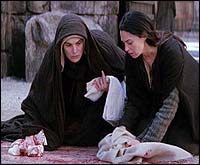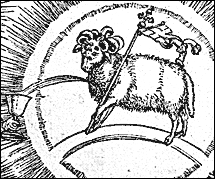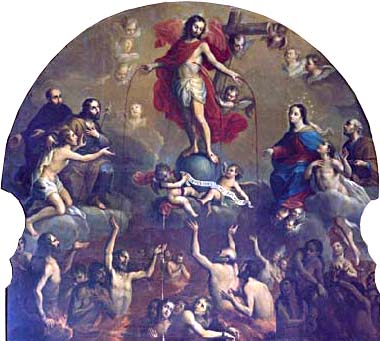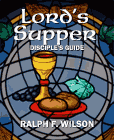Free E-Mail
Bible Studies
Beginning the Journey (for new Christians). en Español
Old Testament
Abraham
Jacob
Moses
Joshua
Gideon
David, Life of
Elijah
Psalms
Solomon
Songs of Ascent (Ps 120-135)
Isaiah
Advent/Messianic Scriptures
Daniel
Rebuild & Renew: Post-Exilic Books
Gospels
Christmas Incarnation
(Mt, Lk)
Sermon on the Mount
(Mt 5-7)
Mark
Luke's
Gospel
John's Gospel
7 Last Words of Christ
Parables
Jesus and the Kingdom
Resurrection
Apostle Peter
Acts
The Early Church
(Acts 1-12)
Apostle Paul
(Acts 12-28)
Paul's Epistles
Christ Powered Life (Rom 5-8)
1 Corinthians
2 Corinthians
Galatians
Ephesians
Vision for Church
(Eph)
Philippians
Colossians,
Philemon
1
& 2 Thessalonians
1 & 2 Timothy,
Titus
General Epistles
Hebrews
James
1 Peter
2 Peter, Jude
1, 2, and 3 John
Revelation
Revelation
Conquering Lamb of Revelation
Topical
Glorious Kingdom, The
Grace
Great Prayers
Holy Spirit, Disciple's Guide
Humility
Lamb of God
Listening for God's Voice
Lord's Supper
Names of God
Names of Jesus
Christian Art
About Us
Podcasts
Contact Us
Dr. Wilson's Books
Donations
Watercolors
Sitemap
5. My Blood Poured Out for Many (Matthew 26:28)
https://www.jesuswalk.com/lords-supper/5_blood.htm
Audio (21:04)
https://www.jesuswalk.com/mp3files/lords-supper/5_blood.mp3
|
"Then he took the cup, gave thanks and offered it to them, saying, 'Drink from it, all of you. This is my blood of the covenant, which is poured out for many for the forgiveness of sins.'" (Matthew 26:27-28) |
"Then he took a cup, and after giving thanks he gave it to them, and all of them drank from it. He said to them, 'This is my blood of the covenant, which is poured out for many.'" (Mark 14:23-24) |
"In the same way, after the supper he took the cup, saying, 'This cup is the new covenant in my blood, which is poured out for you.'" (Luke 22:20) |
"In the same way, after supper he took the cup, saying, 'This cup is the new covenant in my blood; do this, whenever you drink it, in remembrance of me.'" (1 Corinthians 11:25) |
 St. Mary (left) and Mary Magdalene (right) wiping up Jesus' blood from the courtyard where the scourging took place. From Mel Gibson's "The Passion of the Christ" (2004, NewMarket Films). |
Let's focus on the sentence:
"This is my blood ... which is poured out for many for the forgiveness of sins.'" (Matthew 26:28)
To understand Jesus' words, we need to explore how blood was used in the Old Testament, the role of the Paschal lamb, and the roots of Jesus' phrase "poured out for many." In chapter 6 we'll consider the covenantal aspect of the Lord's Supper, where the key verse is from Exodus: "Moses then took the blood, sprinkled it on the people and said, 'This is the blood of the covenant that the LORD has made with you in accordance with all these words.'" (Exodus 24:8). But in this chapter let's explore the blood of Christ shed for us.
Blood Reserved for Atonement
From the earliest times, God commanded his people -- from Noah on down -- not to drink blood (Genesis 9:4), even though this was a common practice of their pagan neighbors:
"Any Israelite or any alien living among them who eats any blood -- I will set my face against that person who eats blood and will cut him off from his people. For the life of a creature is in the blood, and I have given it to you to make atonement for yourselves on the altar; it is the blood that makes atonement for one's life." (Leviticus 17:10-11)
There are two views of this passage. One is that blood represents life, for "The life of the flesh is in the blood." The other is that the blood denotes death, specifically life that is offered up in death. The second is much closer to Biblical thought. Victor Hamilton writes:
"Atonement for sins was made by the sacrifice of the life of animals as a substitution for one's own life, and the shedding of blood was the most important element in the expiation of sin. Hence, the prohibition on human imbibing. It was too sacred for ordinary man to handle."1
Blood Sacrifices in the Old Testament
When sin was concerned, blood sacrifices were mandatory in the Old Testament:
"In fact, the law requires that nearly everything be cleansed with blood, and without the shedding of blood there is no forgiveness." (Hebrews 9:22)
When a person sinned, the Law prescribed that a lamb or goat without defect would be brought. The offender was to lay his hand on the head of the sin offering and slaughter it before the Lord at the tabernacle or temple. Then the priest was to take the blood, sprinkle some on the horns of the altar of burnt offering and pour out the rest at the base of the altar (Leviticus 4:27-35). There was also a daily sacrifice for the sins of the people (Exodus 29:38) as well as an annual Day of Atonement (Yom Kippur, Leviticus 16).
People in our culture look at blood sacrifice with revulsion, as well we should. It is an awful thing. But this is not some primitive practice to appease a bloodthirsty God in order to ward off evil. Rather it is an act of God's mercy and grace (Psalm 51:16-17). Let me explain.
Sacrifice was God's way of teaching us the seriousness of sin; it was not an end in itself. Instead of snuffing out a person for sin or rebellion, God offered a way for the forgiveness of sins, the death of an animal instead of a person. A lamb or goat or bull was costly, teaching that sin is costly. The requirement of a blood sacrifice for sin was ultimately fulfilled in Christ, who is the sacrifice for our sins, once and for all. No further sacrifice can be made. Any subsequent sacrifice of an animal is an affront to God, suggesting that the sacrifice of his Son was not enough.
When I was in college I can remember being confused about this issue. Does one have to understand and accept Jewish law before one can become a Christian? Fortunately, no! Christ has died for our sins whether or not we understand how he fulfilled the Law. Is fulfillment of the Old Testament law of sacrifice really what Jesus' crucifixion was all about? Yes, I finally concluded. If we are to understand accurately why the cross was necessary, we must turn to Old Testament sacrifice.
Jesus fulfills all of the required sacrifices for sin. The Law required an animal for a human life (the lesser for the greater), but God provided his own Son as a sacrifice for our sins (the greater for the lesser), bringing us to God.
|
Q1. How were Old Testament sacrifices a way of
God showing grace and mercy to his people?
|
Sacrificing the Paschal Lamb
The night Jesus instituted the Lord's Supper was Passover night. Jesus and his disciples were seated around a low table partaking of the Passover Meal, the Paschal lamb, slain earlier in the day for the members of this band of disciples. Passover looked back at least 1200 years to Israel's deliverance from Egypt. That night, God had directed that a lamb be slain for every household, to protect the firstborn of that family from being slain.
"Then they are to take some of the blood and put it on the sides and tops of the doorframes of the houses where they eat the lambs....
"On that same night I will pass through Egypt and strike down every firstborn -- both men and animals -- and I will bring judgment on all the gods of Egypt. I am the LORD. The blood will be a sign for you on the houses where you are; and when I see the blood, I will pass over you. No destructive plague will touch you when I strike Egypt." (Exodus 12:7, 12-13)
Jesus not only fulfilled the sacrificial laws, he also fulfilled Passover. Paul writes: "Christ, our Passover lamb, has been sacrificed" (1 Corinthians 5:7).
Poured Out
Now let's examine in greater detail the words in our passage:
"This is my blood ... which is poured out for many for the forgiveness of sins.'" (Matthew 26:28)
The verb "poured out" ("shed," KJV), which we saw in chapter 1, is ekcheō, "cause to be emitted in quantity, pour out." In the cultic sense, "pour out" (compare Leviticus 4:7), especially of Jesus' death, "blood shed for (the benefit of) many..."3 The expression "shed blood" is used of the violent slaying of Old and New Testament martyrs (Matthew 23:35; Romans 3:15 = Isaiah 59:7; Acts 22:20; Revelation 16:6).4 Here is a strange confluence of two ideas: (1) blood shed as part of a ritual sacrifice and (2) blood violently shed to martyr a servant of God. With this word Jesus is explaining that his death on the cross -- violent and unrighteous as it might seem -- is also a sacrifice of atonement for sin. The cruelty of the cross does not signal the tragic end to a promising ministry, but God's plan of redemption for all mankind.
The purpose of this violent sacrifice is made clear with two other words. In the phrase, "for many," the preposition "for" peri, here means, "a marker of events which are indirectly involved in a beneficial activity, 'on behalf of.'"5 Jesus is saying that his blood is being shed for the benefit of others.
|
Q2. Why did Jesus refer to the violent nature of his death in the Words of Institution? What did this probably mean to the disciples at the time? What did it probably mean to them later?
|
Poured Out for Many
Let's explore another interesting word: "many." Jesus says, "This is my blood ... which is poured out for many for the forgiveness of sins'" (Matthew 26:28). Jesus also uses this same phrase, "for many," in Mark 10:45 = Matthew 20:28: "For even the Son of Man did not come to be served, but to serve, and to give his life as a ransom for many." Why? Jesus is making a clear and direct reference to the Suffering Servant passage of Isaiah 53 that he closely identified with his own ministry:
"After the suffering of his soul,
he will see the light [of life] and be satisfied ;
by his knowledge my righteous servant will justify many,
and he will bear their iniquities.
Therefore I will give him a portion among the great,
and he will divide the spoils with the strong,
because he poured out his life unto death,
and was numbered with the transgressors.
For he bore the sin of many,
and made intercession for the transgressors." (Isaiah 53:11-12)
In Isaiah 53 we see the very center of the Words of Institution -- Jesus' voluntary sacrifice.
Jesus doesn't use the phrase "for many" to somehow limit his forgiveness to only some, rather than all of mankind (1 John 2:2; John 1:29). Rather he uses that phrase from Isaiah 53:13 so that the disciples will recall the entire Suffering Servant passage and from it gain understanding of the reason for his death.
|
Q3. Why did Jesus purposely point his disciples to the phrasing found in Isaiah 53? How does this chapter help explain the meaning of Jesus' death?
|
Christ's Blood in the New Testament
In our day, certain branches of the Christian Church are embarrassed by the blood of Christ. Some have stricken it from hymnals as too graphic, too morbid, too primitive an interpretation of Jesus' death. But the New Testament is not shy about the subject. It is very important to notice that most often the word "blood" in the New Testament becomes a symbol for the whole concept of Jesus' sacrificial, atoning death, not just a mention of his blood as somehow separated from his atoning death. Now, with that in mind, here are some passages to ponder:
Redemption
"You were redeemed ... with the precious blood of Christ" (1 Peter 1:18-19).
"Redemption through his blood, the forgiveness of sins...." (Ephesians 1:7).
Entering "the Most Holy Place once for all by his own blood, having obtained eternal redemption" (Hebrews 9:12).
Purchase (a concept closely related to redemption)
"... With your blood you purchased men for God" (Revelation 5:9).
"The church of God, which he bought with his own blood" (Acts 20:28).
Forgiveness and Atonement
"God presented him as a sacrifice of atonement, through faith in his blood" (Romans 3:25).
"Since we have now been justified by his blood...." (Romans 5:9).
Sanctification, Cleansing, and Purification from Sin
"How much more ... will the blood of Christ ... cleanse our consciences" (Hebrews 9:14).
"... The blood of Jesus, his Son, purifies us from all sin" (1 John 1:7).
"... Who have been chosen ... through the sanctifying work of the Spirit, for obedience to Jesus Christ and sprinkling by his blood...." (1 Peter 1:2).
"Jesus also suffered outside the city gate to make the people holy through his own blood" (Hebrews 13:12).
Freedom and Victory over Sin and Satan
"To him who loves us and has freed us from our sins by his blood...." (Revelation 1:5).
"They overcame him by the blood of the Lamb and by the word of their testimony...." (Revelation 12:11).
Reconciliation to and Peace with God
"But now in Christ Jesus you ... have been brought near through the blood of Christ" (Ephesians 2:13).
"... Through him to reconcile to himself all things ... by making peace through his blood, shed on the cross" (Colossians 1:19-20).
"We have confidence to enter the Most Holy Place by the blood of Jesus" (Hebrews 10:19-20).
"May the God of peace, who through the blood of the eternal covenant brought back from the dead our Lord Jesus...." (Hebrews 13:20-21).
Depictions of the Blood of Christ
In the New Testament, Jesus' blood is not especially glorified, though Peter refers to "the precious blood of Christ" (1 Peter 1:19). But by the middle ages Christ's blood had become a focus of worship. You see paintings and woodcuts of angels collecting in a chalice the blood from Christ's wounds on the cross (John 19:34), or from the slain Lamb on the throne in Revelation (Revelation 5:6). Perhaps the most graphic depiction of the blood of Christ in our own day is Mel Gibson's portrayal of the scourging of Jesus in his movie "The Passion of the Christ" (NewMarket Films, 2004), with Jesus' mother and Mary Magdalene wiping up his blood which covered the courtyard where Jesus' scourging took place.
 |
 |
| Detail from "Adoration of the Lamb" (1432, part of the Ghent Altarpiece) by Jan van Eyck | Detail from "Adoration of the Lamb" (1497-98) woodcut by Albrecht Dürer. Click to see larger image. |
 Miguel Cabrera, "The Allegory of the Precious Blood of Christ" (18th century), Museo Nacional del Virreinato, Tepotzotlán, Mexico. |
|
Songs about the Blood of Jesus
The last couple of centuries has produced a number of gospel songs that focus on the blood of Christ, including:
"There Is a Fountain Filled with Blood, Drawn from Emmanuel's Veins," words by William Cowper (1772), music: 19th century American camp meeting tune.
"There Is Power in the Blood," words and music by Lewis E. Jones (1899).
"What Can Wash Away My Sin? Nothing but the Blood of Jesus," words and music by Robert Lowry (1876).
"Oh, the Blood of Jesus, It Washes White as Snow" (unknown author)
"Are You Washed in the Blood?" words and music by Elisha A. Hoffman (1878).
"The Blood Will Never Lose Its Power," by Andraé Crouch (©1966 by Manna Music, Inc.)
It is indeed valuable to ponder the blood of Christ and the suffering that Jesus endured for us. But it is possible to linger so long on the morbid details of his death that we forget the meaning of his death for us. Jesus' Words of Institution point to the meaning of the cup:
"This is my blood ... which is poured out for many for the forgiveness of sins.'" (Matthew 26:28)
Poured Out for the Forgiveness of Sin
The purpose of that sacrifice, of course, is forgiveness, pardon, freeing from sin.
"Forgiveness" ("remission" KJV), aphesis, means, "the act of freeing from an obligation, guilt, or punishment; pardon, cancellation."6 The object of forgiveness is "sins" (hamartia), the generic word to describe all kinds of sin and guilt.
Jesus deliberately died so that you might be freed from the burden and guilt of your sin. Some have characterized Christianity as a fear- and guilt-driven religion. They have it wrong. God doesn't hold our sins over our heads with the threat of hell and condemnation. Instead, he forgives our sins fully, accepting Jesus' sacrifice for the forgiveness of sins as payment in full for your debt to God and for mine. What good is a such an act to compel compliance to the rules of a church? None at all, if the forgiveness is full and complete, never to be brought back upon us again (Isaiah 43:25; Jeremiah 31:34; Psalm 103:12; Micah 7:19).
What have you been carrying, my friend? What burden? What guilt? For what misdeed of the past have you been beaten down by self-reproach and guilt? Then partake of the Lord's Supper in full faith, listening carefully to the words:
"This is my blood ... which is poured out for many for the forgiveness of sins.'" (Matthew 26:28)
As you drink of the cup, you are affirming that Christ's blood was shed for your forgiveness and your pardon. Instead of being a club to beat you into obedience, God lays down the club completely. The resulting motivator is no longer fear or guilt, but love.
"There is no fear in love. But perfect love drives out fear, because fear has to do with punishment. The one who fears is not made perfect in love. We love because he first loved us." (1 John 4:19)
This is news almost too good to be true, but it is the message of grace found the Old Testament and the New. Paul the murderer wrote, "Here is a trustworthy saying that deserves full acceptance: Christ Jesus came into the world to save sinners -- of whom I am the worst" (1 Timothy 1:15). What have you done that is too great for Christ to have atoned for on the cross? Nothing. No sin is too great for his mercy. No iniquity too heinous that he cannot forgive it because of the violent shedding of his blood as a sacrifice for you.
And so the invitation is open to you and to all:
"The Spirit and the bride say, 'Come!' And let him who hears say, 'Come!' Whoever is thirsty, let him come; and whoever wishes, let him take the free gift of the water of life" (Revelation 22:17).
|
Q4. What do the Words of Institution say to us about forgiveness? Why is it important for us to repent of known sin before taking the Lord's Supper?
|
 Available as e-book and paperback. |
Prayer
Thank you, O Lord, for your love for us, that led you to allow your blood to be shed in a violent death that we might find forgiveness, redemption, cleansing, and the peace that comes from wholeness in you. Thank you. In Jesus' holy name, we pray. Amen.
References
- Victor P. Hamilton, dām, TWOT #436.
- Haimetekchusia , "shedding of blood," is a compound noun from haima, "blood," + ekchunō, "shed, pour out" (Thayer)
- Ekcheō , BDAG 312, 1.a.
- Johannes Behm, ekcheō, TDNT 2:467-469.
- Louw & Nida, New Testament Greek-English Lexicon, §90.39. In other parallels to the Words of Institution, this is huper, "in behalf of." Ernst Harald Reisenfeld (peri, TDNT 6:53-56) notes that during the Hellenistic period, the distinction between peri and huper fades to some degree, with the result that peri with the genitive can be used in the sense, "on behalf of, for."
- Aphesis , BDAG 155, 2. Rudolf Bultmann, aphiēmi, TDNT 1:509-512.
Copyright © 2025, Ralph F. Wilson. <pastor![]() joyfulheart.com> All rights reserved. A single copy of this article is free. Do not put this on a website. See legal, copyright, and reprint information.
joyfulheart.com> All rights reserved. A single copy of this article is free. Do not put this on a website. See legal, copyright, and reprint information.
 |

|
In-depth Bible study books
You can purchase one of Dr. Wilson's complete Bible studies in PDF, Kindle, or paperback format -- currently 48 books in the JesusWalk Bible Study Series.
Old Testament
- Abraham, Faith of
- Jacob, Life of
- Moses the Reluctant Leader
- Joshua
- Gideon
- David, Life of
- Elijah
- Psalms
- Solomon
- Songs of Ascent (Psalms 120-134)
- Isaiah
- 28 Advent Scriptures (Messianic)
- Daniel
- Rebuild & Renew: Post-Exilic Books
Gospels
- Christmas Incarnation (Mt, Lk)
- Sermon on the Mount (Mt 5-7)
- Luke's Gospel
- John's Gospel
- Seven Last Words of Christ
- Parables
- Jesus and the Kingdom of God
- Resurrection and Easter Faith
- Apostle Peter
Acts
Pauline Epistles
- Romans 5-8 (Christ-Powered Life)
- 1 Corinthians
- 2 Corinthians
- Galatians
- Ephesians
- Philippians
- Colossians, Philemon
- 1 & 2 Thessalonians
- 1 &2 Timothy, Titus
General Epistles
Revelation
Topical

 To be notified about future articles, stories, and Bible studies, why don't you subscribe to our free newsletter, The Joyful Heart, by placing your e-mail address in the box below. We respect your
To be notified about future articles, stories, and Bible studies, why don't you subscribe to our free newsletter, The Joyful Heart, by placing your e-mail address in the box below. We respect your